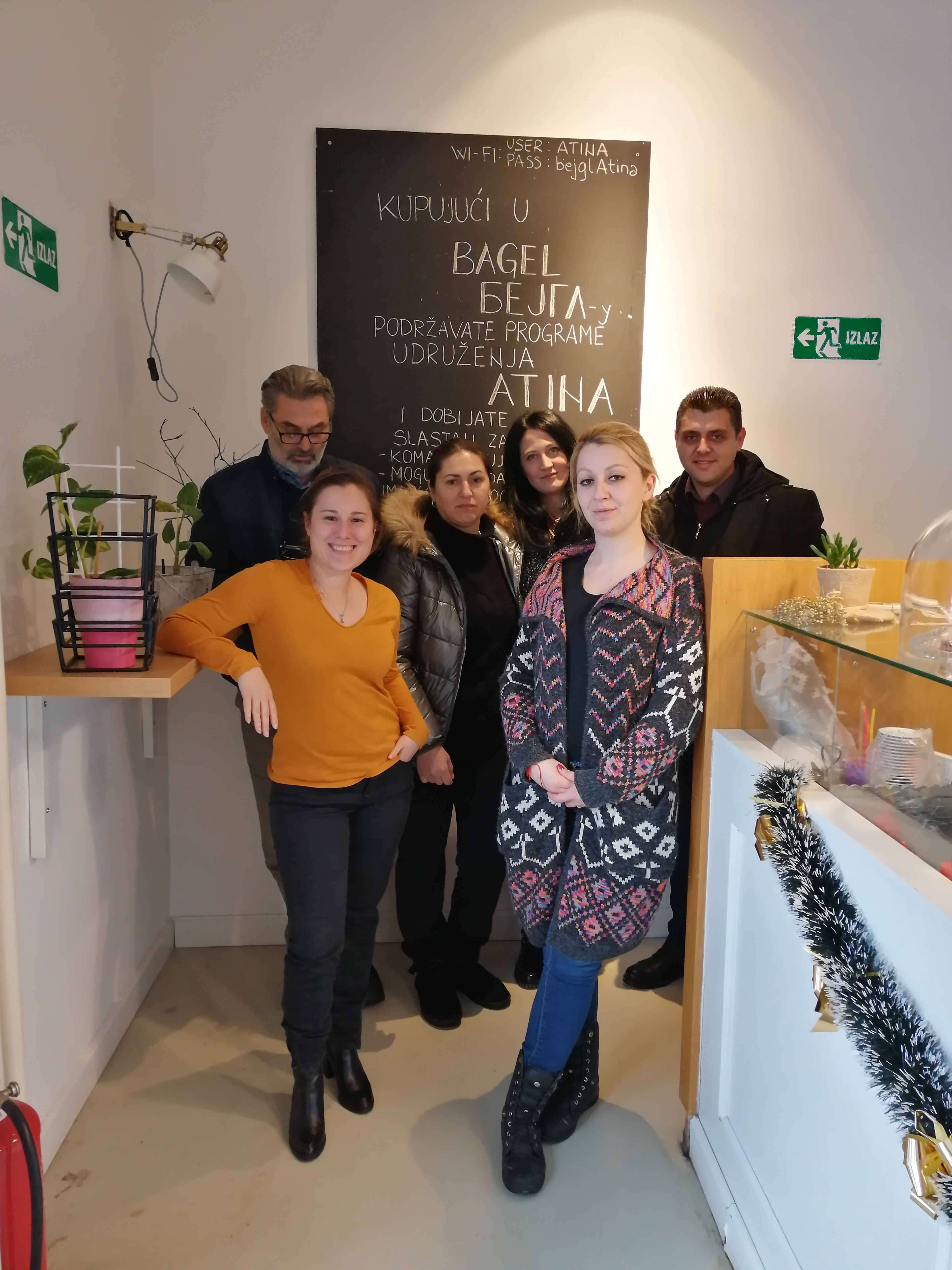Hotline: +381 61 63 84 071
Key words of social entrepreneurship - networking, cooperation and support

Photograph: Archive of NGO Atina
Key words of social entrepreneurship - networking, cooperation and support
We have hosted our dear colleagues from the Association Izbor from Strumica, Northern Macedonia, in our Bagel Bejgl shop. Aside from the exchange of experiences on providing support to the most vulnerable in our society, representatives of Citizens’ Association Atina also shared their experience in establishing and managing a social enterprise, i.e. specifically women’s entrepreneurial initiative. Women’s entrepreneurship is an important element in economic empowerment of women, particularly women from marginalized and vulnerable groups, and thus represents an influential area in the overall fight for gender equality and creation of a more just society.
Colleagues from Strumica have also recognized the importance of social entrepreneurship both in local and broader community. They plan to establish their own Bagel social enterprise in Northern Macedonia. To that end, they were curious to hear examples from practice and experiences in running such a business. What they found extremely valuable was Atina’s experience in overcoming obstacles and challenges related to running such entity, as well as the methods for overcoming the obstacles Atina has faced with. Through this exchange of ideas and experiences of different organizations, the noble idea of social entrepreneurship is being spread, and its implementation supported in other parts of Western Balkans. What is more, regional cooperation among civil society organizations is enhanced and synergic encouragement is provided for further fight against human trafficking, violence against women and all forms of exploitation, discrimination and marginalization of vulnerable groups in broader, regional frameworks.
Atina’s experiences in founding and running a social enterprise represent an important backbone to other actors in civil society who wish to embark on this business venture, as it provides quick and direct insight into all the challenges this process brings; it is also a source of ideas for creating necessary partnerships, merging different segments of support to victims, as well as paving the path of state entities on how to deal with this matter. This is essential as it is a well-known fact that there is no legal framework for social entrepreneurship in the countries of the region (as is the case in Serbia, too), and that some countries despite nominal and declarative support to regulating this issue, haven’t still enacted laws that would facilitate and enhance the work of social enterprises.
Immediately upon their return to Strumica, our colleagues have started running a Bagel shop, as a means of support to persons who are trying to recover from drug abuse consequences. The work of this shop is grounded on social enterprise model with a vision and mission not only to empower these persons themselves, but to also commit to creating funding sources that will not be solely reliant on the support of donor community, which will contribute to organization’s sustainability. At the opening of the shop a clear message was sent – running a profitable and successful business while helping others across the globe without any corrupt or fraudulent practice is definitely the concept that will change the world. “Social entrepreneurs are the carriers of change, dreamers and leaders, they bring positive changes to a society and inspire others. Finally, they are innovators who initiate ideas and solutions to existing social issues in a society. We are convinced that only a combination of social responsibility, ecological balance, economic capability and political engagement can lead to safe and dignified life of the youth today and future generations,” said Director of Citizens’ Association Izbor.
Only social entrepreneurship is and can be a solution to many problems we are facing in society, and it can benefit citizens and communities. Unemployment rate is constantly on the rise, lack of opportunities for training, practice and acquiring specialized knowledge are the challenges many categories of citizens are facing - youth, poorly educated, or the ones who do not have an opportunity for further training, the ones who lack socially responsible business models to advance, and others.
Citizens' Association Atina is proud of the colleagues from Citizens’ Association Izbor from Strumica, especially of the choice they’ve made in order to overcome similar challenges many civil society organizations have been facing, and because they provided a specific solution to the problem of including marginalized persons into everyday social and life trends. Although these steps enhance responsibility of civil society organizations, at the same time they must ensure that countries and their state systems within the set frameworks also contribute and are a part of this responsibility, to an extent to which they ought to care for their citizens.
This text was produced in the framework of the project "Support to Priority Actions for Gender Equality in Serbia", implemented by the United Nations Entity for Gender Equality and the Empowerment of Women (UN Women) with funding from the European Union. The views contained in the text are those of the authors and do not necessarily represent the views of UN Women, the United Nations or any of its affiliated organizations. The project is part of the initiative for supporting women entrepreneurship, women in rural areas, decreasing labor market and employment discrimination, encouraging dialogue on the importance of economic empowerment of women and exchange of knowledge and information among women entrepreneurs.













 FACEBOOK
FACEBOOK TWITTER
TWITTER YOUTUBE
YOUTUBE